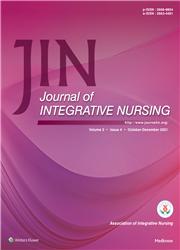Smartphone dependency and its impact on academics among medical and nursing students: A cross-sectional study
Q4 Nursing
引用次数: 1
Abstract
Objective: This study aimed to assess smartphone dependency and its impact on academics among medical and nursing students. Materials and Methods: A cross-sectional study was carried out on Bachelor of Medicine and Bachelor of Surgery (MBBS) and Bachelor of Science in Nursing (BScN) students in a medical teaching institute. The Smartphone Dependency Scale and self-structured questionnaire on impact of smartphone on academics were used to assess smartphone dependency and its impact on academics. A total of 436 students were selected using the total enumerative sampling technique. Data were analyzed using the descriptive (frequency, percentage, mean, and standard deviation) and inferential (t-test, Chi-square test) statistics. Results: The mean age of students was 20.6 ± 1.29 years, 81% were females, and the mean body mass index score was 21.59 ± 3.41 kg/m2. The mean impact on academics and smartphone dependency scores was 19.92 ± 7.01 and 48.58 ± 11.46, respectively. The impact on academics had a significant association with student category (P < 0.001) and gender (P < 0.001). A significant association was found between the impact on academics (P = 0.003) and smartphone dependency (P = 0.05) with studying class. Conclusion: The use of smartphones is more among medical students. Students studying in the first and second years are found to be more dependent on smartphone, which caused a serious impact on their academics. Smart appliances have become mandatory in this era of technology, and it is not possible to stop its usage but negative impact of smartphones on students' academic performance needs to be addressed. Therefore, it is mandatory to organize educational seminars and workshops to promote the appropriate use of smartphones.智能手机依赖及其对医学和护理专业学生学业的影响:一项横断面研究
目的:本研究旨在评估医护生智能手机依赖及其对学业的影响。材料与方法:对某医学教学机构医学外科学学士(MBBS)和护理学理学士(BScN)学生进行横断面研究。采用智能手机依赖量表和智能手机对学术影响自构问卷来评估智能手机依赖及其对学术的影响。采用全枚举抽样法,共选取436名学生。采用描述性统计(频率、百分比、平均值和标准差)和推断性统计(t检验、卡方检验)对数据进行分析。结果:学生平均年龄为20.6±1.29岁,女性占81%,平均体质指数评分为21.59±3.41 kg/m2。学业成绩和智能手机依赖得分的平均影响分别为19.92±7.01和48.58±11.46。对学术的影响与学生类别(P < 0.001)和性别(P < 0.001)显著相关。对学业的影响(P = 0.003)和对智能手机的依赖(P = 0.05)与学习班级之间存在显著关联。结论:医学生使用智能手机的比例较高。研究发现,一、二年级的学生对智能手机的依赖程度更高,这对他们的学业造成了严重影响。在这个科技时代,智能家电已经成为强制性的,它的使用是不可能停止的,但智能手机对学生学习成绩的负面影响需要解决。因此,必须举办教育研讨会和讲习班,以促进正确使用智能手机。
本文章由计算机程序翻译,如有差异,请以英文原文为准。
求助全文
约1分钟内获得全文
求助全文
来源期刊

Journal of Integrative Nursing
Nursing-General Nursing
CiteScore
0.40
自引率
0.00%
发文量
3
审稿时长
17 weeks
 求助内容:
求助内容: 应助结果提醒方式:
应助结果提醒方式:


